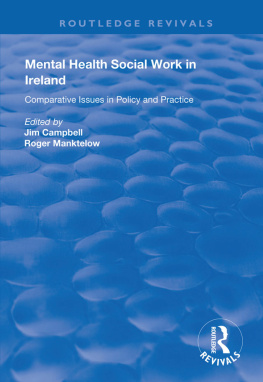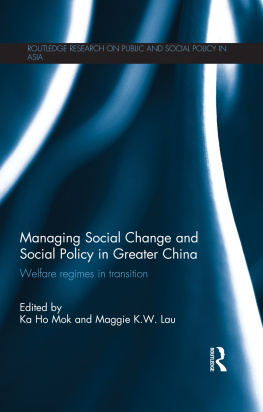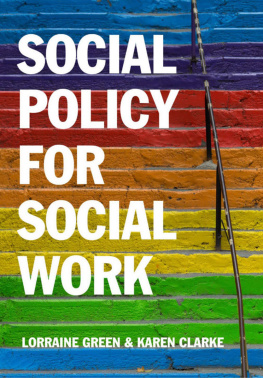SOCIAL CHANGE, SOCIAL POLICY AND SOCIAL WORK IN THE NEW EUROPE
First published 1998 by Ashgate Publishing
Reissued 2018 by Routledge
2 Park Square, Milton Park, Abingdon, Oxon, OX14 4RN
711 Third Avenue, New York, NY 10017, USA
Routledge is an imprint of the Taylor & Francis Group, an informa business
Copyright Anna Kwak and Robert Dingwall 1998
All rights reserved. No part of this book may be reprinted or reproduced or utilised in any form or by any electronic, mechanical, or other means, now known or hereafter invented, including photocopying and recording, or in any information storage or retrieval system, without permission in writing from the publishers.
Notice:
Product or corporate names may be trademarks or registered trademarks, and are used only for identification and explanation without intent to infringe.
Publishers Note
The publisher has gone to great lengths to ensure the quality of this reprint but points out that some imperfections in the original copies may be apparent.
Disclaimer
The publisher has made every effort to trace copyright holders and welcomes correspondence from those they have been unable to contact.
A Library of Congress record exists under LC control number: 98071970
ISBN 13: 978-1-138-34337-5 (hbk)
ISBN 13: 978-1-138-34340-5 (pbk)
ISBN 13: 978-0-429-43917-9 (ebk)
Robert Dingwall is Professor of Sociology in the School of Sociology and Social Policy at the University of Nottingham.
Tina Eadie is a Lecturer in the Centre for Social Work, School of Sociology and Social Policy at the University of Nottingham.
Ewa Giermanowska is an Assistant in the Centre of Youth Studies, Institute of Applied Social Sciences, University of Warsaw.
Jzefina Hrynkiewicz is a Professor in the Department of Social Policy, Institute of Applied Social Sciences, University of Warsaw.
Anna Kwak is a Professor in the Department of Social Pathology, Institute of Applied Social Sciences, University of Warsaw.
Daniel Lawrence has recently retired as a Senior Lecturer in the School of Sociology and Social Policy at the University of Nottingham.
Fionnuala Lordan is a Lecturer in the Department of Applied Social Studies at the National University of Ireland, Cork.
Mark Lymbery is a Lecturer in the Centre for Social Work, School of Sociology and Social Policy at the University of Nottingham.
Andrzej Mociskier is an Assistant Professor in the Department of Social Pathology, Institute of Applied Social Sciences, University of Warsaw.
Lennart Nygren is Professor of Social Work in the Department of Social Welfare at the University of Ume.
Staffan berg is a Lecturer in the Department of Social Welfare at the University of Ume.
Gillian Pascall is a Senior Lecturer in the School of Sociology and Social Policy at the University of Nottingham.
Fred Powell is Professor of Applied Social Studies at the National University of Ireland, Cork.
Paul Ransome was formerly a Lecturer in the School of Sociology and Social Policy at the University of Nottingham and is now a Lecturer in the Department of Sociology and Anthropology at the University of Wales, Swansea.
Paul Roberts is a Lecturer in the Department of Law at the University of Nottingham.
Izabela Rybka is an Assistant in the Department of Social Policy, Institute of Applied Social Sciences, University of Warsaw.
Marek Rymsza is an Assistant in the Department of Social Policy, Institute of Applied Social Sciences, University of Warsaw.
Robert Dingwall
Anna Kwak
This book brings together a selection of papers produced as a result of the collaboration of the Universities of Warsaw, Nottingham, Cork and Umea in a programme of work funded by the EU TEMPUS programme between 1992 and 1997. The objective of the programme was to improve the preparation of social welfare professionals by the University of Warsaw for employment in the new market-oriented society that was being created in Poland after the end of real socialism in 1989. The programme had several components intended to develop the curriculum and pedagogy of the Institute of Applied Social Sciences in Warsaw and to improve its resource base. Its philosophy was not one of exporting West European models of economic and social organization, but of creating opportunities for colleagues from the different institutions to share their experiences. The Polish partners would then consider what to adopt and what to discard in the light of their local situation. Most of the papers in this volume were produced as part of a series of workshops to support curriculum development and were previously published in Polish in one or other of two collections, Wybrane problemy pacy socjalnej [Selected Problems of Social Welfare], edited by Anna Kwak, and Edukacja do pracy socjalnej [Education for Social Welfare], edited by Anna Kwak and Andrzej Mociskier. All of them have been revised and updated for the present volume and some additional material has been commissioned to provide a fuller context.
Why do the participants in this programme want to share their experience more widely? What is the justification for this collection? We believe that there are two elements which should make this work of general interest to anyone who is interested in social policy and social work in any European or European-style society. As the programme developed the participants found themselves in the middle of two debates which are currently being conducted in most developed countries. The first is over the nature and purpose of university education and its relation to the labour market. Should universities worry about the employment of their graduates and the skills that are needed by the wider economy and society or should they simply concern themselves with their own mission to transmit advanced learning? The second is over the modernization of the welfare state. Despite the very different experiences of the four countries in the programme, the participants came to a common analysis of the failures of the approaches to welfare which had been dominant over the post-war period. The Polish experience, and the Western partners reaction to it, provided a particularly good case study. The abruptness of change in Poland and the explicit choices faced by that society since 1989 revealed the extent to which Western Europe had either avoided these issues or had produced evolutionary responses which had had a larger cumulative impact than had often been acknowledged.
The Nature and Purpose of Universities
In the days of real socialism, universities had played a rather marginal role in Polish society. The workers state did not attach a high value to non-manual forms of work (see chapters by Hrynkiewicz and Rymsza) and the universities were assigned a minor role in the production of certain kinds of professional and as bearers of the national culture in literature, humanities and so on. Given the troubled history of the Polish nation, and the extent to which culture rather than territory, had often been its defining characteristic during periods of foreign occupation, the latter was not a trivial matter. However, the graduates fed mainly into a small intellectual class whose importance often seemed greater outside Poland than inside. Provided that the universities did not cause trouble for the regime, and there were various mechanisms in place to ensure this, they were treated largely with a kind of benign neglect. They became conservative and inward-looking institutions, whose agenda was largely defined by those who worked in them, where the organization often encouraged patronage and nepotism and where the limited resources and prestige system favoured theoretical over practical studies.










